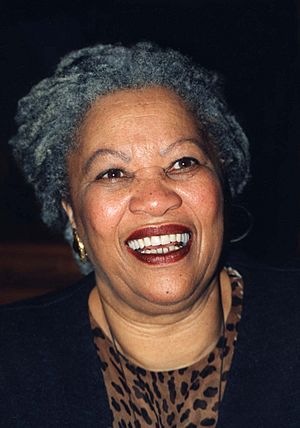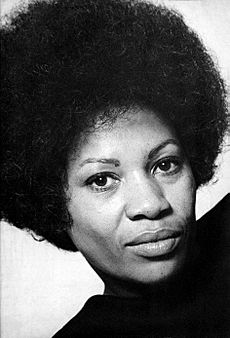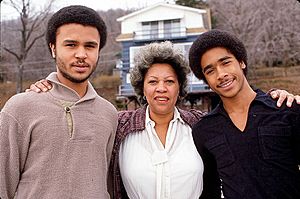Toni Morrison facts for kids
Quick facts for kids
Toni Morrison
|
|
|---|---|

Morrison in 1998
|
|
| Born | Chloe Ardelia Wofford February 18, 1931 Lorain, Ohio, U.S. |
| Died | August 5, 2019 (aged 88) New York City, U.S. |
| Occupation |
|
| Education | |
| Genre | American literature |
| Notable works |
|
| Notable awards |
|
| Spouse |
Harold Morrison
(m. 1958; div. 1964) |
| Children | 2 |
| Signature | |
 |
|
Chloe Anthony Wofford Morrison (born Chloe Ardelia Wofford; February 18, 1931 – August 5, 2019), known as Toni Morrison, was a famous American novelist. Her first novel, The Bluest Eye, came out in 1970.
Her book Song of Solomon (1977) was very popular and won the National Book Critics Circle Award. In 1988, Morrison won the Pulitzer Prize for her novel Beloved (1987). She was also awarded the Nobel Prize in Literature in 1993.
Toni Morrison was born and grew up in Lorain, Ohio. She earned a Bachelor of Arts degree in English from Howard University in 1953. She then got a master's degree in American Literature from Cornell University in 1955.
In the late 1960s, Morrison became the first Black female editor in fiction at Random House in New York City. She became well-known as an author in the 1970s and 1980s. Her book Beloved was even made into a movie in 1998. People praise Morrison's books for showing the difficult effects of racism in the United States and the experiences of Black Americans.
Morrison received many honors during her life. In 1996, she was chosen for the Jefferson Lecture, a top U.S. government award for achievements in the humanities. She also received the National Book Foundation's Medal for her great contributions to American literature that same year. President Barack Obama gave her the Presidential Medal of Freedom in 2012. In 2020, she was added to the National Women's Hall of Fame.
Contents
Early Life and Education
Toni Morrison was born Chloe Ardelia Wofford. She was the second of four children in a working-class Black family. Her parents were Ramah and George Wofford. Her mother was from Greenville, Alabama, and her father was from Cartersville, Georgia. They moved to Lorain, Ohio, a town where different races lived together. They hoped to avoid racism and find good jobs. Her father worked many different jobs, including as a welder.
When Morrison was about two years old, her family's landlord set their house on fire because they couldn't pay rent. Morrison said her family reacted by laughing at the landlord. She felt this showed how to stay strong and keep your spirit even when facing very difficult situations.
Morrison's parents taught her about her heritage and language. They told traditional African-American folktales and ghost stories, and sang songs. Morrison loved to read as a child. Some of her favorite authors were Jane Austen and Leo Tolstoy.
When she was 12, she became a Catholic. She took the baptismal name Anthony, which led to her nickname, Toni. At Lorain High School, she was part of the debate team, the yearbook staff, and the drama club.
Career Highlights
College and Early Work
In 1949, Toni Morrison went to Howard University in Washington, D.C.. She wanted to be around other Black thinkers. At Howard, she saw racially segregated restaurants and buses for the first time. She graduated in 1953 with a degree in English.
She then earned a master's degree from Cornell University in 1955. Her master's paper was about how Virginia Woolf and William Faulkner wrote about feeling alone. She taught English at Texas Southern University and then at Howard University. While teaching at Howard, she met Harold Morrison, an architect, and they married in 1958. They had two sons before divorcing in 1964.
After her divorce, Morrison started working as an editor for a textbook company in New York. Later, she moved to Random House in New York City. There, she became the first Black woman to be a senior editor in the fiction department.
Helping Black Writers Shine
As an editor, Morrison played a big part in bringing Black literature to a wider audience. She worked on important books like Contemporary African Literature (1972). This collection included works by famous writers from Nigeria and South Africa.
She also helped many new Black American writers get published. These included poet Toni Cade Bambara and activist Angela Davis. She even published the autobiography of boxing champion Muhammad Ali, called The Greatest: My Own Story (1975).
One special project Morrison worked on was The Black Book (1974). This book was a collection of photos, drawings, essays, and documents about Black life in the U.S. from slavery to the 1920s. It was very well-received.
Becoming a Novelist
Morrison started writing her own stories as part of a group at Howard University. She brought a short story about a Black girl who wished for blue eyes. This story later became her first novel, The Bluest Eye. She wrote it early in the mornings while raising her two children.
The Bluest Eye was published in 1970 when Morrison was 39. Critics praised her writing style. The book didn't sell well at first. However, colleges started adding it to their reading lists for Black studies programs, which helped its sales. This book also caught the attention of a famous editor, Robert Gottlieb, who would edit most of her future novels.
In 1975, her second novel, Sula (1973), was nominated for the National Book Award. It was about the friendship between two Black women. Her third novel, Song of Solomon (1977), tells the story of Macon "Milkman" Dead III as he grows up and learns about his family's past. This book became very popular and won the National Book Critics Circle Award. It was the first novel by a Black writer to be chosen by the Book of the Month Club since 1940.
Morrison's next novel, Tar Baby (1981), was set in modern times. It tells the story of Jadine, a fashion model, and Son, a drifter.
In 1983, Morrison left her editing job to focus more on writing. She taught English at different universities. In 1986, her first play, Dreaming Emmett, was performed. It was about the murder of Emmett Till in 1955.
The Beloved Trilogy and the Nobel Prize
In 1987, Morrison published Beloved, her most famous novel. It was inspired by the true story of Margaret Garner, an enslaved African-American woman. Beloved was a huge success and a bestseller for many weeks. Many critics praised it highly.
Even though it was highly praised, Beloved did not win the National Book Award or the National Book Critics Circle Award at first. Forty-eight Black critics and writers, including Maya Angelou, spoke out against this. Two months later, Beloved won the Pulitzer Prize for Fiction.
Beloved is the first of three novels about love and African-American history. Morrison said these books are meant to be read together. The second novel, Jazz, came out in 1992. It tells a love story during the Harlem Renaissance in New York City, using language that sounds like jazz music. That same year, she also published Playing in the Dark: Whiteness and the Literary Imagination (1992). This book looked at how Black Americans are shown in white American literature.
Before the third novel in the trilogy was published, Morrison won the Nobel Prize in Literature in 1993. She was the first Black woman from any country to win this award. The Nobel committee praised her novels for their "visionary force and poetic import," saying they bring to life an important part of American reality. In her acceptance speech, Morrison spoke about the power of storytelling.
In 1996, Morrison gave the Jefferson Lecture, a top honor for intellectual achievement in the humanities. She also received the National Book Foundation's Medal of Distinguished Contribution to American Letters.
The third novel in her Beloved Trilogy, Paradise, was published in 1997. It is about people living in an all-Black town. The next year, Morrison appeared on the cover of Time magazine.
Beloved on Screen and Oprah's Book Club
In 1998, the movie version of Beloved was released. Jonathan Demme directed it, and Oprah Winfrey helped produce it and starred as the main character, Sethe. The movie did not do well at the box office, but critics still praised Oprah's performance.
In 1996, TV talk-show host Oprah Winfrey chose Song of Solomon for her new Book Club. This club became very popular. When Winfrey chose Morrison's first novel, The Bluest Eye, in 2000, it sold 800,000 more copies. Many people called this boost in sales "The Oprah Effect."
Oprah Winfrey chose four of Morrison's novels for her book club over six years. This helped Morrison's books sell even more than they did after she won the Nobel Prize. Morrison appeared on Oprah's show three times. Oprah said that her book club wouldn't have existed if Morrison hadn't shared her love of words. Morrison called the book club a "reading revolution."
Later Works and Honors
Morrison continued to explore different art forms. She wrote words for classical music pieces, working with composers like André Previn. She also wrote the story for a new opera called Margaret Garner, which was based on the same true story as her novel Beloved. The opera premiered in 2005.
Her novel Love came out in 2003. In 2004, she wrote a children's book called Remember. It marked 50 years since the Brown v. Board of Education Supreme Court decision, which made racially segregated public schools illegal.
From 1989 until she retired in 2006, Morrison taught at Princeton University. She created the Princeton Atelier, a program where students work with writers and artists to create new art.
In 2006, The New York Times Book Review named Beloved the best American fiction book published in the previous 25 years. This showed how important her novel had become in American literature.
Morrison's novel A Mercy, published in 2008, is set in Virginia in 1682. It tells a powerful story about early American history.
Final Years
In 2010, Morrison's younger son, Slade Morrison, passed away from pancreatic cancer. He was 45 years old. Morrison had been halfway through writing her novel Home at the time. She stopped writing for a while but later finished the book, dedicating it to Slade. Home was published in 2012. It tells the story of a Korean War veteran in the 1950s who tries to save his sister from cruel medical experiments.
In 2011, Morrison worked on a play called Desdemona with director Peter Sellars and singer Rokia Traoré. It was a new look at William Shakespeare's play Othello, focusing on the relationship between Othello's wife and her African nursemaid.
Morrison's eleventh novel, God Help the Child, was published in 2015. It follows a woman named Bride, whose mother treated her badly as a child because of her dark skin. This trauma continues to affect Bride's life.
Personal Life
Toni Morrison married Harold Morrison in 1958 while she was teaching at Howard University. She took his last name. Their first son, Harold Ford, was born in 1961. She was pregnant with their second son, Slade Kevin, when she and Harold divorced in 1964. Slade was born in 1965.
Morrison moved with her sons as her career took her to different cities for her editing and teaching jobs. Her son Slade Morrison died in 2010. This was a very difficult time for her, and she paused her writing for a year or two before finishing her novel Home.
Death and Legacy
Toni Morrison passed away on August 5, 2019, in New York City, at the age of 88. She died from complications of pneumonia.
A memorial event was held for her in New York City in November 2019. Many famous people, including Oprah Winfrey and Angela Davis, spoke about her life and work.
Documentaries About Toni Morrison
Several documentary films have been made about Toni Morrison's life and work:
- Identifiable Qualities (1988) by Sindamani Bridglal.
- Imagine – Toni Morrison Remembers (2015) by Jill Nicholls, where Morrison talked about her life.
- The Foreigner's Home (2016), which explored Morrison's ideas about foreigners and their impact on culture.
- Toni Morrison: The Pieces I Am (2019) by Timothy Greenfield-Sanders, featuring interviews with Morrison and others.
Awards and Honors
Toni Morrison received many awards and honors throughout her life, recognizing her incredible contributions to literature and the humanities. Some of them include:
- 1977: National Book Critics Circle Award for Song of Solomon
- 1988: Pulitzer Prize for Fiction for Beloved
- 1993: Nobel Prize in Literature
- 1996: Jefferson Lecture
- 1996: National Book Foundation's Medal of Distinguished Contribution to American Letters
- 2000: National Humanities Medal
- 2012: Presidential Medal of Freedom
- 2016: PEN/Saul Bellow Award for Achievement in American Fiction
- 2020: Inducted into the National Women's Hall of Fame
- 2023: Featured on a USPS Forever stamp
Images for kids
-
Street art depicting Toni Morrison in Vitoria, Spain.
See also
 In Spanish: Toni Morrison para niños
In Spanish: Toni Morrison para niños
 | Sharif Bey |
 | Hale Woodruff |
 | Richmond Barthé |
 | Purvis Young |




